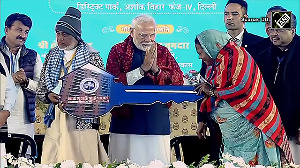It is possible to argue that the Chinese are the Americans of Asia while the Indians are the Europeans. As players on the international stage, the United States and China are both goal-oriented and able to act decisively in their national interest. Despite the existence of internal divisions they are coherent entities that speak with a unified voice. Backed by hard power their strategic planners take a long-term view of evolving rivalries and alliances.
In contrast, the Indians like their European counterparts are notable for the glacial pace of their decision-making. Constrained by the workings of coalition politics, both the 27-member EU and India valorise plurality and argumentation over actual outcomes and performance. They often appear unable to articulate a clear vision of their national (or in the case of the EU, regional) interests with internal factiousness hijacking unified, long-term agendas. Polyphonic (both boast over 20 official languages) and seemingly chaotic, the world's two most populous democracies are prominent advocates of multilateralism.
The commonalities between the EU and India are underscored by the fact that their governments use an identical catchphrase to describe their union: "unity in diversity".
But despite the similarities, or perhaps because of them, neither India nor the EU is particularly interested in the other. Rather, it is the US and China that form the twin poles of their (once again) common strategic fixations.
For the EU, an entity with a single market and common trade policy, this orientation is in large part a consequence of economics. It shares the world's biggest bilateral economic relationship with the United States. Transatlantic flows of trade and investment amount to around $1 billion a day, and account for almost 40 per cent of world trade.
However, while the US remains Europe's largest export market, China has become its primary source of imports. Sino-EU trade (goods and services combined) in 2008 was worth a whopping 360 billion euros, with China enjoying a surplus of almost 170 billion euros. European companies invested 4.5 billion euros in China in the same year.
In contrast, EU-India economic ties are much less impressive despite the EU being India's largest trading partner. At 67.8 billion euros in 2007, EU-India trade was less than one fifth that of Europe's trade with China. European companies invested only 852 million euros in India in 2008 (although this was a sharp drop compared to 2007).
As a result there is a substantial difference in the level of EU interest towards China and India. For example, 15 European Commissioners visited China last year (including four trips by Peter Mandelson, the former trade commissioner) as opposed to only three commissioner visits for India. Almost every major think tank in Brussels has one or more China experts. Remarkably there is not a single India specialist to be found. The Chinese embassy in Brussels is over 80-people strong, including academics and strategists deputed from universities. India's embassy on the other hand is staffed by a dozen or so officers.
European officials claim the Chinese are easier to negotiate with than the Indians since they come to the table with clear goals and adequate resources to back the process. But they say the Indians seem more interested in arguing than finding solutions in addition to being arrogant and understaffed.
Ironically these are similar charges to those levelled against the Europeans by their Indian counterparts. Confusion over the varying competences of Brussels versus the member states, the patronising attitude of the European Parliament - a body that is quick to censure India's human rights record - and understaffing of the India desks at the European Commission are common complaints on the Indian side.
Whereas the Chinese spend considerable energy in cultivating the EU, in part because their strategists see a self-interest in playing Brussels off against the member states, India tends to give the EU short shrift. Unlike Beijing or Washington, Brussels is unable to speak with one voice on the issues that New Delhi cares about. From India's desire for a permanent seat on the United Nations Security Council to last year's support for the civilian nuclear energy deal with the US, the European Union has been unable to formulate a united stance.
The EU's lack of a cogent foreign or defence policy hobbles its strategic importance to New Delhi. But uncertainty in how to deal with a supra-national government results in a failure to engage the EU adequately even as an economic partner. For example, the Indian commerce ministry (unlike its Chinese counterpart) does not release aggregate statistics for India-EU trade so that China, rather than the European Union, is billed as India's largest trade partner.
The free trade agreement that is currently being negotiated between the two governments may go some way in ameliorating this situation. But officials on both sides admit formidable obstacles in the path of the talks, with no sight of resolution.
Consequently India and the EU remain polite-ish acquaintances rather than friends. This mutual underprioritising of bilateral ties takes place despite the declaration of a "strategic partnership" between Brussels and New Delhi in 2004. Substantial points of common interest - including climate change, the evolution of a truly multipolar world and the opening up of two huge markets for their respective businesses - do not seem to have ignited the imaginations of their governments or peoples.
Yet, the EU and India share more in orientation and spirit with each other than they do with China and arguably even the United States. Each may be understandably frustrated with the other's under-resourced, coalition-driven, decision-making process.
But ultimately they would do well to assess each other not as fixed entities but as ongoing processes. The EU might not always be as toothless on strategic issues as it is today, just as India's economic reach will not always be limited to its current extent. A new world order is being shaped. India and the EU can continue to ignore each other only at their peril.







 © 2025 Rediff.com -
© 2025 Rediff.com -